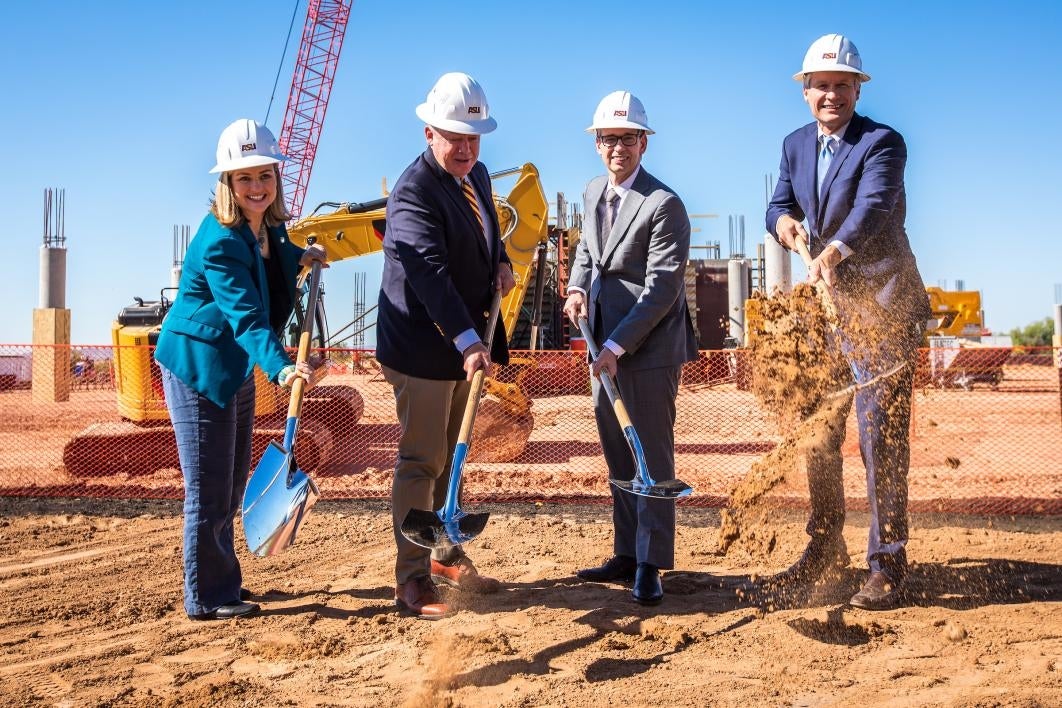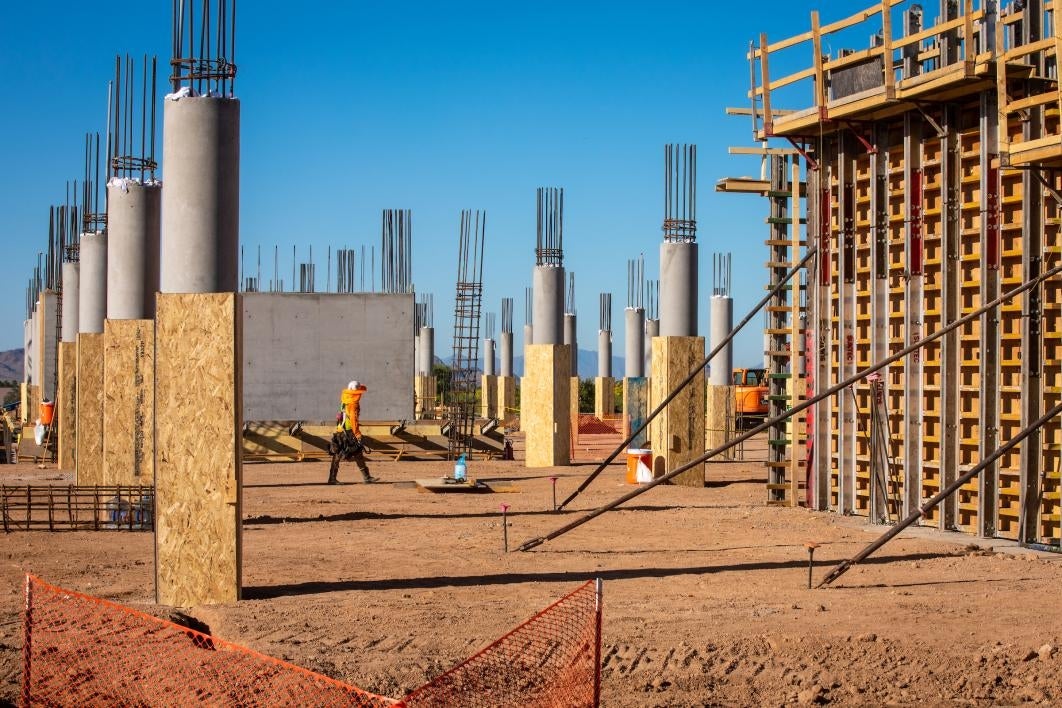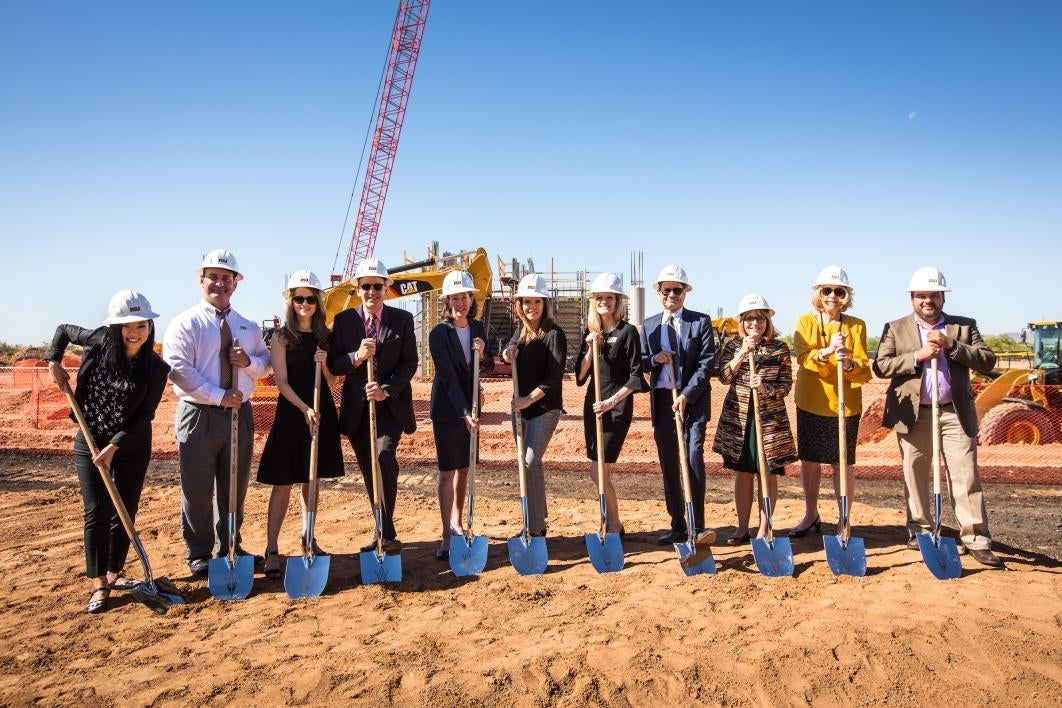Editor's note: This story is being highlighted in ASU Now's year in review. Read more top stories from 2019.
A giant, grinning inflatable Sparky marked the spot Thursday morning on a soon-to-be-bustling-with-construction dirt lot where Arizona State University and Mayo Clinic broke ground on the new Health Futures Center, a 150,000-square-foot building that will feature a MedTech Accelerator, biomedical engineering and informatics research labs, nursing programs and an innovative education zone.
Several present at the event remarked that the move was a long time coming in the university and Mayo Clinic’s 16-plus-year relationship.
ASU President Michael Crow addressed a crowd that included city officials and university leadership, saying the new facility, just steps away from Mayo Clinic’s north Phoenix campus, is like “a 150,000-square-foot flag” announcing the institutions’ shared vision to accomplish three things:
• Reinforce the notion that a university is an institution capable of assembling expertise and knowledge-creation assets in many places where they can make the greatest impact.
• Further foster a relationship between ASU and Mayo Clinic that leads to better solutions, outcomes and learning environments through intensified research, clinical expansion and development of innovative clinical approaches to medicine and health care.
• Serve as a catalyst for a concentration of new-age thinkers and new types of institutions thinking about health futures.
“We think that the two of us together can be the corpus or the center or the anchor of what could evolve to be something that hasn't yet developed in this country and hasn't yet developed anywhere in the world, and that is the broadest focused health futures place,” Crow said.
ASU and Mayo Clinic formalized their relationship in 2016 with the announcement of the Mayo Clinic and Arizona State University Alliance for Health Care. Over the years, the nation’s most innovative university and the world leader in patient care and research have partnered on programs that range from nursing to medical imaging to regenerative and rehabilitative medicine to wearable biosensors.
"This will be a hub of life science innovation that will not only benefit ASU students and researchers but truly the patients of the future."
—President and CEO of Mayo Clinic Gianrico Farrugia
They have also worked together on dual degree programs, a nursing education program, research projects, more than 80 joint faculty appointments and numerous joint intellectual property disclosures.
The new facility, scheduled to open in late 2020, will be owned and operated by the university and will connect to Mayo Clinic via a desert pathway. It is the first of several buildings planned to dot the surrounding landscape in the coming years and represents a cooperative effort not only of Mayo Clinic and ASU, but of the city of Phoenix and state of Arizona, as well.
ASU leases the property from the Arizona State Land Trust; the city of Phoenix will provide funding for infrastructure improvements and ASU will construct the building, which is budgeted at $80 million. The debt service for the building will be funded primarily from the research infrastructure fund established in 2017 by Gov. Doug Ducey and the state Legislature.
Phoenix Mayor Kate Gallego, who served on the City Council when the ASU-Mayo Clinic alliance was first approved, expressed her belief Thursday that the partnership is an economic engine for the city. She noted that Phoenix expects to see $3.5 billion in capital investment over the next two years — compared with Houston, another large Southwestern city, which expects to see only $1.5 billion — and an additional 4.4 million square feet of advanced facilities, creating more than 7,000 jobs.
“We do feel like, at the city of Phoenix, part of our role is to make sure there's the space and financial support for the great things that ASU, Mayo and others are doing,” Gallego said.
“We were proud financial partners when Mayo moved forward with proton beam therapy, and we enjoyed working with Dr. Crow and others to grow campuses throughout the city of Phoenix. … When we have that type of leadership, our No. 1 ranked hospital and our No. 1 ranked university for innovation working together, anything can happen in the city of Phoenix.”
One example of the type of innovative collaborations happening through the Mayo-ASU alliance is the recently launched MedTech Accelerator, a program that provides medical device and health care IT early-stage companies with personalized business development plans. Once construction of the new building is complete, it will be housed on the second floor, helping entrepreneurs accelerate to market and investment opportunities.
President and CEO of Mayo Clinic Gianrico Farrugia also shared remarks with the crowd on Thursday. He assured them that the health care industry is in a state of disruption and transformation, and that those in the field must begin to think differently if they are to better serve the health of the community, calling ASU an “ideal partner” in that endeavor.
“Mayo Clinic and ASU share a vision,” Farrugia said. “It's a vision to create a collaborative environment of expertise right here in the Valley. And this place will be a destination for students, for entrepreneurs, for biomedical professionals. They will come to us from everywhere in the region and, indeed, from around the world. This will be a hub of life science innovation that will not only benefit ASU students and researchers but truly the patients of the future.”
Top photo: Shovels feature the ASU pitchfork logo at the ceremonial groundbreaking of the 150,000-square-foot first building of the ASU Health Futures Center, adjacent to the Mayo Clinic in north Phoenix, on Thursday. The collaborative center will provide educational and research facilities, biomedical engineering and informatics research labs and opportunities for partnerships with private industry. Photo by Charlie Leight/ASU Now
More Health and medicine

Reducing waste in medical settings
Health care saves lives, but at what cost? Current health care practices might be creating a large carbon footprint, according to ASU Online student Dr. Michele Domico, who says a healthier…

ASU offers bilingual counseling to Spanish speakers
Arizona is one of the five states in the nation with the highest percentage of Hispanic residents, according to the U.S. Department of Health and Human Services Office of Minority Health, and …

College of Health Solutions launches first-of-its-kind diagnostics industry partnership to train the workforce of tomorrow
From 2007 to 2022, cytotechnology certification examinees diminished from 246 to 109 per year. With only 19 programs in the United States, the cytology workforce that stands at the front line of…






